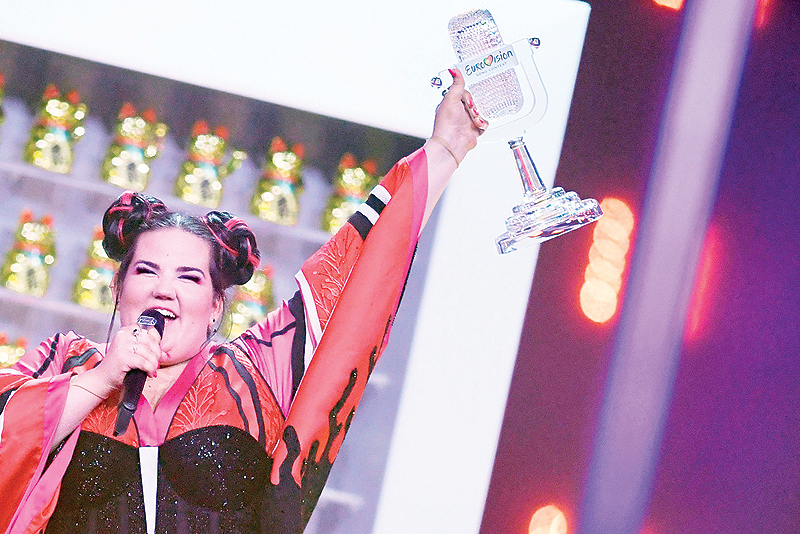Europe's popular annual fest of kitsch and outrageous fashion kicks off Tuesday in Tel Aviv, with Israel hoping the Eurovision Song Contest may help burnish its image despite boycott calls. Last year's winning performance by Israeli singer, Netta Barzilai, with her #MeToo-inspired song "Toy"-which included clucking sounds and chicken-like dance moves-secured her country the right to host this year's televised extravaganza.
The largely European competition, which gifted to the world the Swedish supergroup ABBA, dates back to the 1950s and has widened over the years to include broadcasters who subscribe to the European Broadcasting Union, spreading now as far as Australia. Many culture lovers openly sniff at the contest, deriding it as the height of bad taste. But its irreverent mix of glitz, glamour and over-the-top costumes has won a devoted following of millions, particularly among gay fans.

Madonna under pressure
Although it has waded into complicated geo-political waters in the past, this year's competition has become embroiled in the deep divisions of the Israeli-Palestinian conflict. Big-name rock stars including Pink Floyd's Roger Waters and British singer Peter Gabriel have unsuccessfully urged that it be relocated to another country.
US music icon Madonna has come under pressure to drop two performances she will reportedly give when the semi-finals culminate in the finals on Saturday, May 18. And the pro-Palestinian Boycott, Divestment and Sanctions (BDS) movement is calling for the event to be boycotted as part of its campaign against Israel's occupation of Palestinian territories. "We Palestinian singers, songwriters, dancers, musicians and other artists urge all Eurovision 2019 finalists to withdraw from the contest," it said in a statement on its website.
But such moves have been dismissed by organizers and this year 41 nations are competing, with the Netherlands favorite to win, according to a survey of bookmakers by independent fan website Eurovision World. Dutch singer Duncan Laurence sits at a piano to perform his love song "Arcade". "Hosting Eurovision is one of Israel's biggest coups in terms of popular culture on the international stage," Israeli daily Haaretz wrote on its opinion page. "The prestige and primetime global attention for Israel may prove too big a temptation for Hamas to ignore."
Voice of LGBT youth
Around 200 million people are expected to tune in for Saturday's finals, and to mark the occasion Tel Aviv is also brushing up its gay-friendly image. "Eurovision is an opportunity for incredible global exposure," the coastal city's mayor Ron Huldai told a recent press conference. "Tel Aviv will welcome thousands of tourists, will host 1,500 journalists, and will be seen by tens of millions of viewers." Israel won the job of hosting this year's 64th Eurovision contest after Barzilai's stunning show in Portugal last year.
But this year, the Israeli entry "Home", an operatic-style ballad sung by Kobi Marimi, has been ranked at a lowly 25th place. Other favorites for lifting the trophy include France, whose 19-year-old hopeful, Bilal Hassani, proclaims to be the "voice" and the "face of the LGBT youth who want to change things" with his song "Roi", or king. A huge Eurovision fan since he was a young child, Hassani has become known for his blonde wigs and androgynous looks. But he has faced a barrage of homophobic insults and death threats.
Entries from Sweden, Russia and Azerbaijan are also among the top favorites. While Australia's Kate Miller-Hiedke is making waves with her haunting "Zero Gravity" apparently based on her experiences of post-natal depression. Promoter Live Nation Israel said last month that Madonna would sing two songs during the interval of the contest's finals. An admirer of the Jewish mystical tradition of Kabbalah, she has performed in Israel several times and also made private visits.
Eurovision truce?
Apart from the boycott threat, there has also been talk of possible disruption by rocket fire from Palestinian militant groups Hamas and Islamic Jihad. Last weekend the two groups rained rockets on southern Israel from launch sites in the Gaza Strip, drawing waves of Israeli retaliatory strikes. At least 25 Palestinians, including at least nine militants, were killed. Four Israeli civilians died in the Palestinian rocket attacks.
The cross-border duelling petered out Monday after the Palestinians said they had agreed to a truce brokered by Egypt, but there were warnings it might not hold for long. The "contest might actually have saved the parties from escalating", said Tareq Baconi, analyst with the International Crisis Group think-tank. Those who win through to Saturday's final will join host Israel and the so-called "big five" of Britain, France, Germany, Italy and Spain-all of whom are entitled to skip the elimination rounds. Barzilai's win was Israel's fourth victory and the country previously hosted the contest in Jerusalem in 1979 and 1999.--AFP










